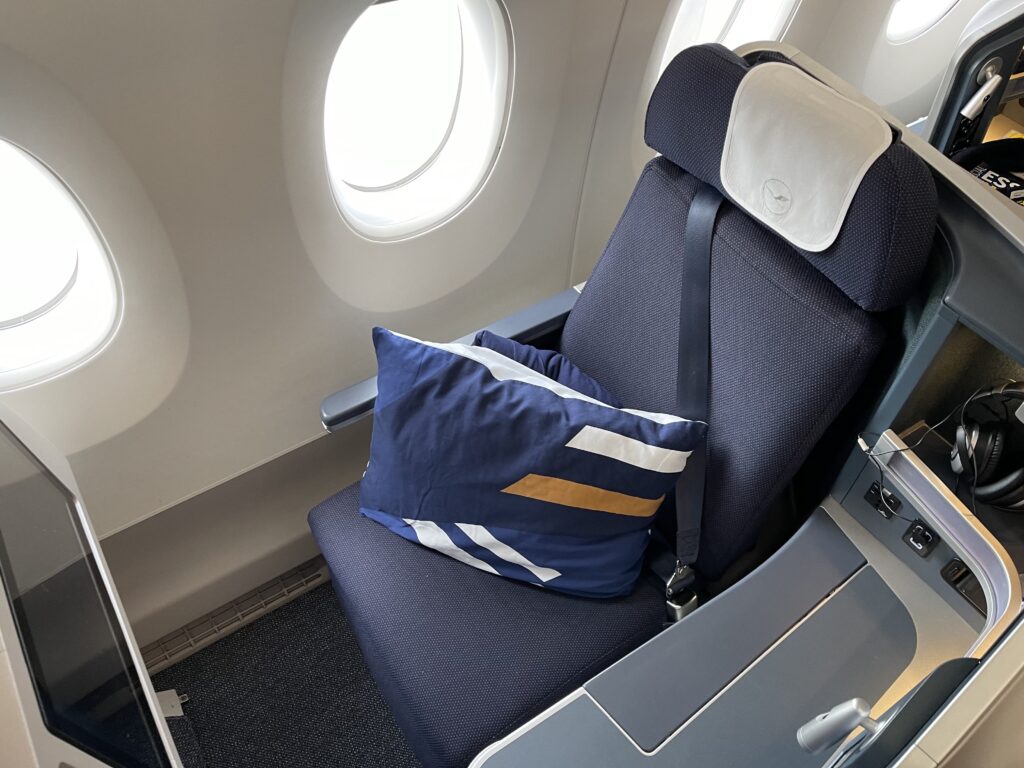 Say what you will about Lufthansa’s business class — and, in these pages, we certainly have — but it has always been consistent. The biggest inconsistency in recent memory was during its upgrade from its old blue Recaro sloping sleepers to the fully flat customised Collins (then B/E) Aerospace Diamond starting in 2012, and even that was conducted swiftly considering the size of the airline.
Say what you will about Lufthansa’s business class — and, in these pages, we certainly have — but it has always been consistent. The biggest inconsistency in recent memory was during its upgrade from its old blue Recaro sloping sleepers to the fully flat customised Collins (then B/E) Aerospace Diamond starting in 2012, and even that was conducted swiftly considering the size of the airline.
Longtime observers, and indeed passengers, will therefore find themselves through the looking-glass at the moment. The airline has been making a big deal out of the arrival of the first of four Airbus A350s and the first of five Boeing 787-9s, each with business class seats superior to what it currently offers, as part of a kind of “New Lufthansa” passenger experience era, and there’s more to come next year when Lufthansa offers four separate business class products.
The first is the existing 2012 customised Diamond, about which enough said.
The second is the A350 “Lifthansa” cabin, the four ex-Philippine Airlines aircraft with Thompson Aero Seating Vantage XL staggered seats designed by LIFT Aero Design (hence the nickname) where Lufthansa changed the fabrics but little else.

The “Lifthansa” reskinned Vantage XL seats are a big step up from the current product, but will only be seen on four A350s. Image: John Walton
The third is the product on the forthcoming Boeing 787-9s, the first of which is to be named Berlin and which, Lufthansa promises, “will have an improved cabin product — including direct aisle access for all guests in Business Class.”
Runway Girl Network understands that these aircraft, and indeed their cabins, were built for but not taken up by airlines in the HNA group, including Hainan Airlines, and that they will feature the Collins Aerospace Super Diamond outward-facing herringbone ordered by HNA.
Lufthansa says that the aircraft will see “several weeks of planned cabin refurbishments at Lufthansa’s maintenance in Frankfurt”, but it’s unlikely that this will include a full cabin reinstall. This is Lufthansa’s first of nearly three dozen Dreamliners for delivery between 2022 and 2027, and customising, designing, certifying and installing the decade-old Diamond seat for a new airframe when a new seat is just around the corner is more hassle than simply reskinning the Super Diamonds. On which note…
The fourth seat is the forthcoming new business class, which RGN understands is to eventually be fleetwide, manufactured by Thompson. It’s not yet clear how this seat — which has been under development for more than five years now — will be laid out across the airline’s widebody fleet. The 777X renderings offer seven “columns” of seats to alternate 1-1-1/1-2-1 in what is a surprisingly less dense cabin than regular staggers.
With the new seat now planned to launch on the Airbus A350, narrower than the 777X, next year, it will be informative to see how this seat and its layout evolve onto the even narrower 787 and A330 cabins, and the wider 747-8I cabin.
Indeed, it will also be interesting to see how Lufthansa’s first new business class installation sizes up against the forthcoming wider A350 cabin with slimmed-down sidewalls. Airbus has remained mum about the details and timing of this change to the A350, and whether it will be all-frames immediately, always optional, or optional for a certain time and then all-frames.
There will be a set of competing pressures for Lufthansa, and for other airlines: do they go for cabin and seat consistency across a larger fleet of A350s (which is beneficial for cost, maintenance and commonality) or do they go for a subfleet with a wider cabin that has slightly different seats, and take the non-commonality penalty that comes with?
It will also be instructive to see how Lufthansa manages the nine oddball aircraft with Vantage XL and Super Diamond in the meantime. Will these aircraft be at the front of the new seats queue for consistency, or at the back of the queue for overall better passenger experience?
Related articles:
- Lufthansa vs “Lifthansa”: how the new Vantage XL stacks up
- Reskinned ex-PAL Vantage XL asks Lufthansa hard new biz questions
- Is Airbus on the cusp of unveiling wider A350 cabin?
- Inside Lufthansa’s design process for its new 777X business class
- Crucial milestone achieved as Boeing 777X takes first flight
Featured image credited to Lufthansa













